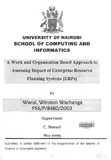| dc.description.abstract | This study aims at assessing the impact of Enterprise Resource Planning Systems (ERPs) using a
work and organization based approach, by studying selected companies in Kenya. The main
motivation of this study is the lack of wealth of literature, for evaluating human and organizational
implications associated with adopting ERPs in organizations. Enterprise Resource Planning systems
are highly complex information systems that have potentially dramatic impacts on many aspects of
work and organization.
The study is geared towards assessing the impact of work reorganization brought about by ERP
implementation on the individual and consequently on the overall organization. The notion of work
reorganization' for the purposes of this study denotes change in work organization variables and
encompasses the change in control to one's work, job description, the organization hierarchy position
and work relationships brought upon an individual as a result ofERP adoption.
The study does not evaluate work reorganization dimension in isolation, rather, it incorporates the
other dimensions of Information quality, system quality, individual impact, workgroup impact and
organizational impact that have already been validated in previous studies. The study then proceeds
to assesses if work reorganization dimension can be incorporated into these existing models brought
about by these studies.
This study employs a case study method -and draws data using, structured questionnaires and semi
structured interviews, from selected companies in Kenya that have implemented ERPs. Descriptive
statistics are used to analyze and interpret the results from !he various dimensions under study.
Structural equation modeling through partial least squares is used in assessing relationships of these
dimensions in order to assess whether the work reorganization dimension can be included.
This study came up with five hypotheses which were supported.by the results of the data analysis. It
emerged that work reorganization brought about by ERP is positively related to the individual
impact. As widely tested and shown in other studies done in 'the context of other information
technology systems and ERPs. as well, this study's data analysis also found that system quality, in the
context of ERP system is positively related, to individual impact. Also as in other prior studies, the
study shows that a relationship exists betwe.en information quality and individual impact and
workgroup impact and organizational impact in that order | en |

